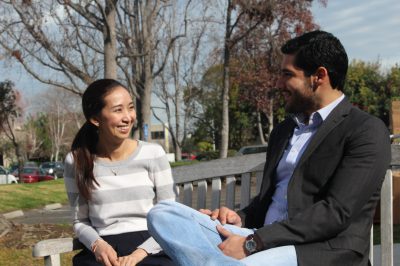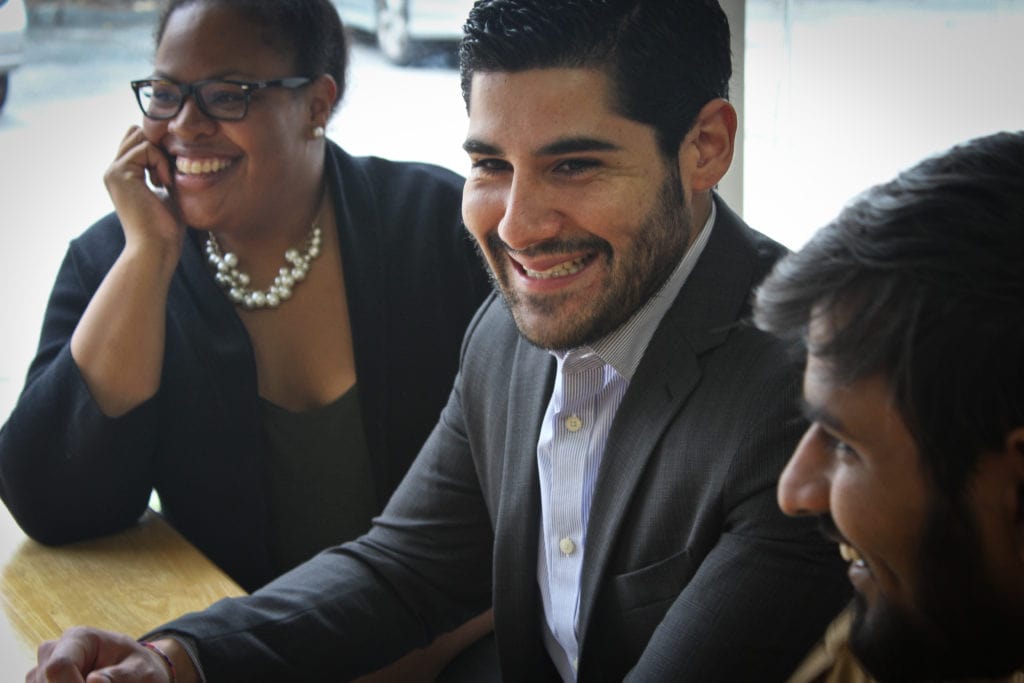The Master of Arts in Counseling Psychology (MACP) degree program provides formal training in the science and practice of family systems therapy and clinical counseling. In addition to a broad and rigorous preparation in counseling psychology, the program provides training in theory and treatment inspired by both secular and spiritual concepts and interventions. Mindfulness, movement, and expressive arts, in both clinician self-care and treatment interventions, are integrated throughout the curriculum.
Students who graduate from the MACP program complete the requirements as set by the California Board of Behavioral Sciences (BBS) for the Marriage and Family Therapy and/or Professional Clinical Counselor educational tracks. In addition, they complete a minimum of one-year supervised practicum providing therapy to clients in preparation for registering as either a Marriage and Family Therapy or Professional Clinical Counselor associate in the State of California. The program also supports students in completing the requirements that they identify to register for post-degree clinical training in many other states and countries.
Careers as LMFTs (Licensed Marriage and Family Therapists) and LPCCs (Licensed Professional Clinical Counselors) often include supervisory positions in counseling agencies as well as serving as clinical staff, managers, directors and administrative positions in substance abuse and mental health treatment settings, hospitals, corrections agencies, and private practice. Students who complete the MACP degree and do not choose to pursue post-degree clinical training often apply their education in other fields, including business, coaching, or spiritual guidance.
The MACP degree is offered as an online program (from our Costa Mesa and Palo Alto CA campus) with some low-residency sessions. Some required courses or parts of courses occur in an intensive residential format. Online courses are taught using the university’s Learning Management System; some of these courses may require participation in synchronous telemediated sessions. The intensive residential classes occur two times per year, typically at the beginning of the Fall and Spring quarters for ten consecutive days. There is a total of six required residential intensives for our full-time students, each of which involves full-day participation, throughout the three-year program. For part-time students, there is a total of eight required intensives, each of which involves full-day participation throughout the four-year program.
Advisers are assigned at the onset of the program and meet with students for ongoing mentoring, advising, and review of readiness to begin clinical practicum. Annually, advisors meet with each student either at the intensives or via synchronous web technology for a formal and documented review of student progress. When necessary, students meet with appropriate faculty members, advisors, and Program Chair for further discussion and recommendations.
State Authorizations for Distance Education
Sofia University is licensed, registered, authorized, certified, or formally exempt in the following states and territories as indicated on our State Authorizations page.
Professional Licensure
Please visit our Professional Licensure page for more information.
Course Information:
At-a-glance information about this course for your convenience:
Program Start Date: | |
|---|---|
Summer Start Date: | July 1, 2024
|
Fall Start Date: | September 30, 2024
|
Winter Start Date: | January 13, 2025
|
Spring Start Date: | April 7, 2025
|
Program Length: | 3 years minimum
|
Total Number of Units: | 90 (Minimum) |
Estimated Total Cost: | $58,500 |
Estimated Fees: | $4,025 |
Format: | The MACP degree is a three-year online and low-residency program with mandatory, intensive sessions twice a year. The in-person intensive occurs on campus one time per year at the beginning of the Fall quarter for ten consecutive days. The virtual synchronous intensive occurs one time per year at the beginning of the Spring quarter for ten consecutive days. |
Alumni Stories


Sofia's academic program, with exposure to multiple modalities, hands-on practicums, as well as real-world experiences, provided me with the solid foundation I needed to confidently pursue my passion for helping others as a therapist. The unwavering support and guidance from a small, yet dedicated, faculty fueled my growth and development, empowering me to excel in my studies and master a wide range of therapeutic techniques. As a practicing therapist, I am grateful for the invaluable skills and knowledge I gained at Sofia University, which has equipped me to provide empathetic and effective support to my clients. Drawing from the diverse therapeutic approaches I learned during my time at Sofia, I am able to tailor my practice to meet the unique needs of each individual while guiding them on their journey toward healing and personal growth.
— Barbara (Blaze) Lazarony, MA
Alumna, MA in Counseling Psychology
Program Features:
Now, more than ever, our world is in need of mental health professionals looking to help families and individuals overcome the challenges they are facing. Our degree program provides you formal training in the science and practice of family systems therapy and clinical counseling.


Experienced Clinical Faculty
Mentorship is an important teaching tool that helps you flourish academically, personally, and professionally. Classes are taught by experienced scholars and clinicians who have integrated psychological and spiritual principles into their counseling practices. Small class size encourages dynamic exchange between students and faculty.


Transpersonal Skills Lab
The MA in Counseling Psychology program features transpersonal skills labs that combine theory, practice, and group formation with deep personal growth and development. These unique learning labs provide practical application and integration.


The Transpersonal Mosaic
A particularly dynamic component of the program is the Transpersonal Mosaic – an immersion into spiritual practices and innovative transpersonal theories and tools. Coursework includes various styles of meditation, principles of Aikido, theories of transpersonal psychology, and diverse modalities for creative expression.


The Practicum Year
This year allows you to practice learned theories and techniques and hone your counseling skills with a full year of clinical work in an agency setting. The practicum includes both face-to-face client hours (LMFT minimum of 225, LPCC minimum of 280) and on-site supervision. Additionally, a clinical faculty member will mentor you in a seminar-style class where you will learn to present case histories in accord with professional standards.
Key Program Highlights:
Just a few things that differentiate our program from a traditional counseling psychology program.
1. Clinical Quarters
Minimum of four quarters of clinical experience before graduation.
2. Transpersonal Labs
Experiential transpersonal skill-building labs.
3. Creative Specialization
Additional specialization in creative expression.
4. Collaborative Education
Education shaped through a collaborative cohort experience.
5. Therapeutic Focus
Focus on individual, child, couple, and family therapy.
5. Professional Prep
Professional preparation for both public and private practice.
6. Aikido Embodiment
The powerful and ancient martial art of aikido helps students embody the stance of a therapist somatically.
Learning Outcomes:
Here’s what you can expect to walk away from this program with…
1. Theory Evaluation
Summarize, compare and evaluate a broad range of theories, perspectives, methods, and research findings, including those of transpersonal psychology and systems theory, used in the field of counseling psychology.
2. Applied Counseling
Apply counseling psychology theories, perspectives, methods, and research findings to important human problems and case examples.
3. Effective Collaboration
Communicate and collaborate effectively as either a transpersonal marriage and family therapist or a transpersonal professional clinical counselor in a variety of mental health settings and with a variety of clients and team members.
4. Whole-Person Reflection
Reflect upon their own whole-person development, including growth in mind, body, spirit, creativity, and community, and identify opportunities for continuing development.
5. Ethical Application
Apply the ethical and professional values, legal standards, and regulations of a transpersonal marriage and family therapist or a transpersonal professional clinical counselor across professional settings and interactions.
Career Paths:
The Master of Arts in Counseling Psychology program is designed to prepare students for a wide variety of career opportunities in the field of mental health. Graduates are equipped with both secular and spiritual counseling approaches, and can effectively apply these in their professional roles.
Licensed Marriage and Family Therapist (LMFT)
As an LMFT, you’ll have the capacity to work with individuals, couples, and families, addressing a broad spectrum of relationship and mental health issues. You could find employment in counseling centers, hospitals, social service agencies, or private practice.
Licensed Professional Clinical Counselor (LPCC)
As an LPCC, your work will be focused on assessing, diagnosing, and treating mental health disorders. Graduates can work in a range of settings, such as hospitals, mental health clinics, and private practice.
Clinical Supervisor or Manager
With your MACP degree, you can also take on supervisory roles within mental health agencies or treatment settings. This could involve overseeing other therapists, developing treatment programs, or managing clinical operations.
Mental Health Advocate or Policy Developer
Some graduates use their knowledge and skills to influence mental health policies or advocate for improved mental health services. This could involve working in government agencies, non-profit organizations, or advocacy groups.
Corporate Consultant or Coach
Many businesses are recognizing the importance of mental health in the workplace and hire consultants or coaches with a background in counseling psychology. In this role, you could provide guidance on mental health strategies, conduct workshops, or offer individual coaching to employees.
Curriculum:
To receive a Master of Arts in Counseling Psychology degree, students must successfully complete a minimum of between 90 and 94.5 units depending on the concentration selected. The following are specific degree requirements.
The Transpersonal Arc provides foundational skills in transpersonal theory and introduces somatic practice, mindfulness, and creative expression as core to whole-person learning. The labs provide further opportunities to explore transpersonal skills for both personal growth and clinical interventions.
The Clinical Core consists of coursework that meets the requirements for the California Board of Behavioral Sciences educational experience for MFT or PCC concentrations as of the publication time of our 2020-2021 academic catalog. These include the following:
- Introductory Clinical Courses (22.5 units)
- Intermediate Clinical Courses (13.5 units)
- Advanced Clinical Courses (23.5-28 units)
You must complete one full year of Clinical Practicum as a Capstone Project. To advance to Clinical practicum, students must be in good standing, have completed all required practicum prerequisites (see Clinical Core Courses above) and 40 hours of personal psychotherapy, and have no outstanding incomplete grades. The MACP faculty member in charge of monitoring practicum must approve the Clinical practicum site. Students must register for the Practicum Evaluation class and Capstone Clinical Practicum Sequence and submit appropriate forms and practicum contracts.
Frequently Asked Questions (FAQs):
This section will address some common queries related to our Master of Arts in Counseling Psychology program, helping you understand the intricacies of the course and its prospective outcomes.
The Master of Arts in Counseling Psychology (MACP) program offers comprehensive training in counseling psychology, focusing on family systems therapy and clinical counseling. The curriculum is steeped in both secular and spiritual principles, incorporating mindfulness, expressive arts, and movement as self-care and intervention techniques.
Upon completion, you’ll fulfill the educational requirements set by the California Board of Behavioral Sciences (BBS) for Marriage and Family Therapy and/or Professional Clinical Counselor tracks. You’ll also have the required supervised practicum for registering as an associate in either of these roles in California, and be supported in meeting post-degree clinical training requirements for other states and countries.
Graduates often assume roles as Licensed Marriage and Family Therapists (LMFTs) and Licensed Professional Clinical Counselors (LPCCs), taking on supervisory positions, clinical staff roles, or administrative duties in various sectors. Graduates not seeking post-degree clinical training can utilize their education in business, coaching, or spiritual guidance fields.
The MACP degree is offered as an online program with low-residency sessions. There are intensive residential classes that occur twice a year for ten consecutive days. The program also makes use of the university’s Learning Management System for online courses.
Students are assigned advisors at the start of the program for ongoing mentorship, advising, and review of readiness to begin clinical practicum. Additionally, advisors conduct annual reviews of student progress and facilitate meetings with faculty members and Program Chair when necessary.








